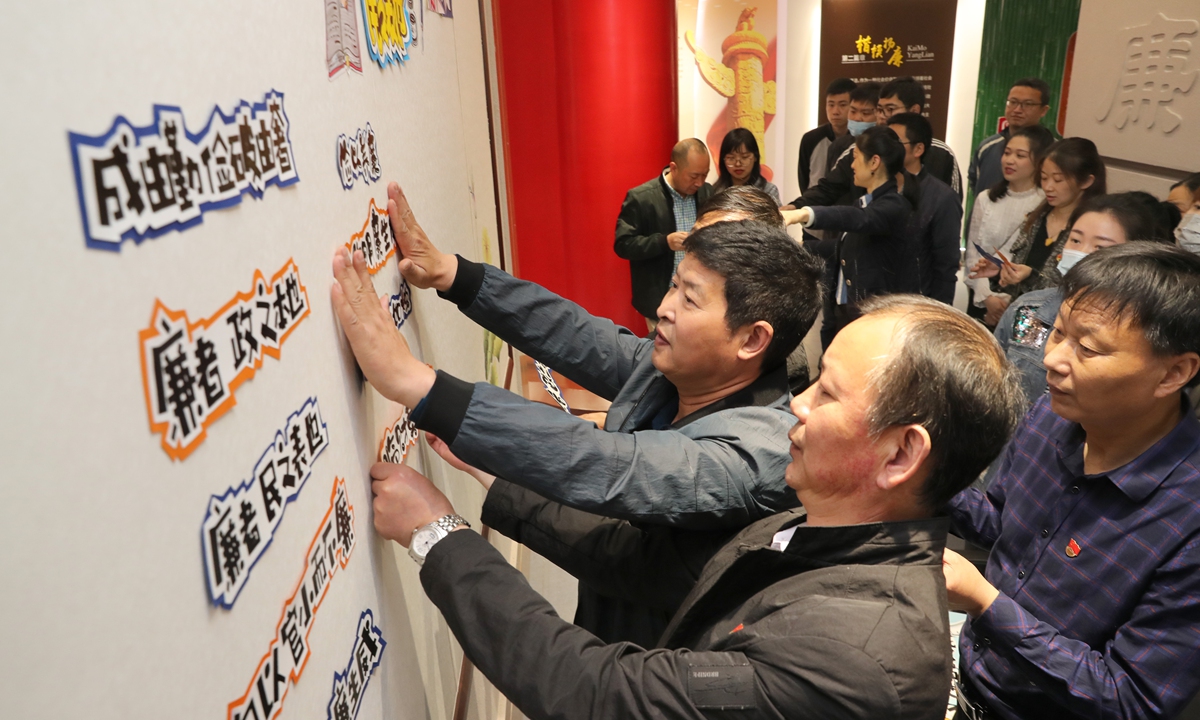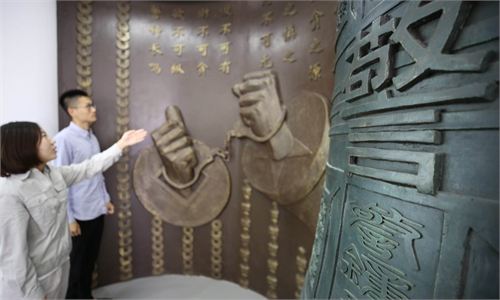IN-DEPTH / IN-DEPTH
Eight-point decision widely seen as a barometer for positive transformations within Party, society: expert

Local civil servants decorate a themed wall at an exhibition featuring combating corruption and building a clean government in Nantong, East China's Jiangsu Province. Photo: IC
The introduction of an eight-point decision has brought about fundamental changes to the political environment in the Communist Party of China (CPC), and has also served as a brake pad for corruption of certain officials on a larger scale, Zhuang Deshui, deputy director of the Research Center for Government Integrity-Building at Peking University, told the Global Times.
An eight-point regulation document was adopted at a meeting of the Political Bureau of the CPC Central Committee, the country's top-ruling body, on December 4, 2012. The document made explicit requirements on how Political Bureau members should improve their work style in eight aspects, focusing on rejecting extravagance and reducing bureaucratic visits, meetings, and empty talk.
When observing typical corruption cases exposed in recent years, many officials began to "slide into the abyss" through extravagant, careless, or needless use of government funds, and later, while being more obviously bureaucratic and indolent, sloppy, or neglectful of their duties, said Zhuang. "So it is clear that corruption is never separate from personal work conduct. That's why the Party's discipline inspection authorities have focused on extravagance and hedonism, and have been cracking down on the small things that are most criticized by the public."
Xi Jinping, general secretary of the CPC Central Committee, has stressed that promoting good Party conduct is always high on the agenda when he addressed the deliberation session of the Anhui delegation to the Second Session of the 12th National People's Congress in March 2014. "We will fall short of our aims if this program tails off and we become lax in the later stages. Leading officials at all levels should enforce standards of good conduct on themselves and others," Xi said.
Being strict in the exercise of power means that leading officials should exercise power in the interests of the people, exercise power in accordance with rules and regulations, keep power within the confines of systemic checks, and neither seek privileges at any time nor abuse power for personal gain, Xi noted.
Over the last decade, the eight-point decision on improving Party's work conduct has put an end to many unhealthy tendencies and become the basic principle of Party members. The thought of privilege has been weakened and the political atmosphere has been improved, Zhuang suggested.
For example, officials are far removed from privileges and closer to the public. They have fewer meetings and documents but more grassroots-level research. There has been less extravagance and more thrift, and Party members and senior officials are increasingly concerned with the development of their undertakings and the needs of the people, according to Zhuang.
From having no way to lodge complaints to being able to use various mechanisms for feedback and whistleblowing, ordinary people are the biggest beneficiaries of the eight-point decision. The decision reversed the practice of "nepotism" and "power first" which was to some extent prevalent in the past, and is very conducive to resolving social conflicts, Zhuang said.
The working conduct style of the Party is a barometer for the ethos of a whole society. Today's healthier social environment is a good result for a decade of the implementation of the eight-point decision, he added.

